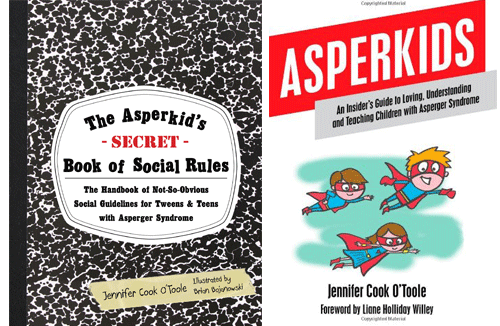Learning with Asperger’s, Learning from Asperger’s
 Asperkids by Jennifer Cook O’Toole
Asperkids by Jennifer Cook O’Toole
The Asperkid’s (Secret) Book of Social Rules
and
Asperkids: An Insider’s Guide to Loving, Understanding and Teaching Children with Asperger Syndrome
Not wrong, just different. That’s the throughline to Jennifer Cook O’Toole’s series on raising and educating kids with Asperger’s Syndrome. The author “translates” the social process so as to provide a framework for both those with Asperger’s Syndrome (‘Aspies’) and those without it (‘Neurotypicals’). By translating, she reasons, there is no need for either Aspies or Neurotypicals to feel that their behaviour is incorrect; their communication styles are simply a little different. In The Asperkid’s (Secret) Book of Social Rules, she addresses kids with Asperger’s Syndrome. In An Insider’s Guide, she addresses Neurotypicals. Aspies tend to resist instruction, especially when it comes from an authority figure who deems their thought patterns incorrect, so O’Toole counters this by explaining that she, too, is an aspie, and that she understands what it’s like. She’s not trying to change them, she says, merely articulating methods of fitting in; methods to make life easier for everyone. She builds a sense of trust very quickly.
Her advice is piercingly astute. Don’t worry, she tells Neurotypical parents, if you see your aspie kid playing by themselves. A parent might recall their own experience of playing along and feeling left out, and therefore assume that the child is lonely or sad. This isn’t the case at all. While Aspergic children like to be included, they are also happy playing alone because it relieves the strain of making conversation – a process Aspies find difficult. Small details like this go far when explaining the subtle differences between Neurotypical mindsets and Asperger mindsets – it’s important to understand each other rather than simply projecting one’s own idea of what is right or normal onto a different kind of person.

The set-up is encouraging. Jennifer Cook O’Toole is married to a man with Asperger’s Syndrome, and has two children with it. By speaking from her experiences within a family unit like this, she rejects the idea that people with Asperger’s Syndrome should be seen as sufferers; rather it is merely a different lifestyle. By surrounding themselves with like-minded people, Aspies can live fulfilling and happy lives. For example, she writes about her husband. He was diagnosed as an adult, and suddenly found that his lifelong passion for the police force – which later turned into a career – had been influenced by his Special Interest. Rather than rejecting his Special Interest, he channeled it into becoming a professional.
Likewise, when it comes to educating her kids; Cook O’Toole utilises her children’s Special Interests to assist their learning. For children with Asperger’s Syndrome, it can be difficult to concentrate on a subject they’re not passionate about. The Asperger mind is much like an on-off switch. Either one is obsessed or indifferent to a subject. Cook O’Toole recognises this, and gives the reader the insight to benefit from it. For example, her daughter’s Special Interest is Greek mythology. So in order to teach her daughter maths, she constructed practical numerical-based scenarios using characters from Greek mythology. Her daughter would have to problem-solve, but would have the enthusiasm of the Special Interest to propel her. To teach her how to type, Cook O’Toole asked her daughter to type out pages from anthologies of Greek mythology. To teach her critical and creative skills, Cook O’Toole asked her to compile a series of book reports on Greek myths. It’s all about channeling the Special Interest in any way possible. She writes that the Special Interest is too often seen as a nuisance; a distraction; but that hiding in plain sight is a portal into the heart and mind of an Aspie.
A lot of books about Asperger’s Syndrome approach it as a problem to be solved, or they talk about people with Asperger’s Syndrome as if they’re not in the room. This series is one of the first to sincerely engage with people who have Asperger’s Syndrome. The author’s hypersensitivity to the nuances of the Asperger mentality, her positive attitude, and indeed her position as a successful professional with Asperger’s Syndrome, are an invaluable addition to the literature on Asperger’s Syndrome.



